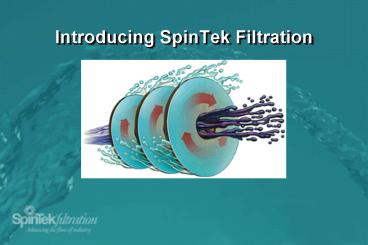Introducing SpinTek Filtration - PowerPoint PPT Presentation
1 / 44
Title:
Introducing SpinTek Filtration
Description:
Los Alamos National Laboratories. DuPont, Phelps-Dodge, Mitsubishi. SX ... Automatic Feed Level Transfer. Ultrafiltration (Ratings per the WHO Guidelines for ... – PowerPoint PPT presentation
Number of Views:105
Avg rating:3.0/5.0
Title: Introducing SpinTek Filtration
1
Introducing SpinTek Filtration
2
SpinTek Filtration, Inc.Markets/Products
- Membrane Filtration
- Coalescers
- Radioactive Waste Treatment
- Drinking Water Systems
3
SpinTek Filtration, Inc.Client List (partial)
- Bechtel, Fluor, Aker Kvaerner, BHP-Billiton
- US Navy, US Department of Energy, Los Alamos
National Laboratories - DuPont, Phelps-Dodge, Mitsubishi
4
SX Dual-Media Filter/Coalescers
5
SpinTek ST-II Rotary Membrane Filtration
6
Los Alamos National Laboratory SpinTek S
Series Tubular Unit
7
- The World Health Organization (WHO) estimates
that more than 1 billion people are without
access to safe and adequate drinking water
sources - Journal of Water and Health
8
Sources of Water
- Ground Water
- Surface Water
9
Water Contaminants
- Biological (Bacteria, viruses, parasites,
Protozoa) - Particulate (Sand, cysts, algae)
- Inorganic (radioactive, arsenic, mercury)
- Organic (solvents, pesticides, cyanides)
10
Biological Water Contaminants
- Bacteria, Viruses, Protozoa
- Parasites (cysts, oocysts, ova)
- Snail larvae and worms
11
Where Biological Contaminants Come From
- Animal and human feces (cryptosporidium, guardia)
- Distribution Systems (Legionella)
- Source Water (Guinea worms, Amoebic
meningoencephalitis)
12
Emerging Health Risks
- Heliocobacter pylori
- Tsukamurella
- Isopora belli and microsporidia
13
Human Health Effects from Biologically
Contaminated Water
- Gastroenteritis Typhoid
- Severe/fatal diarrhea Fever
- Dysentery Hepatitis
- Chryptosporidiosis Cholera
14
Reducing Biological Disease Transmission
- Improved quality of water
- Better excreta disposal
- General hygiene
- WHO Guidelines for Drinking Water Quality, 3rd
Edition
15
How Water Transmits Disease
- Drinking Water
- Cooking Water
- Collecting water to carry home
- Bathing
- General Hygiene
- WHO Guidelines for Drinking Water Quality, 3rd
Edition
16
Sparkle Drinking Water System
17
SparkleAfrica
18
Water Consumption
- Human 20-75 gallons/day
- Milking Cow 30-35 gallons/day
- Cow/Calf Pair 10-30 gallons/day
- Horse 10-20 gallons/day
- Sheep 2-3 gallons/day
- Hog 4-5 gallons/day
- Chickens (100) 4-5 gallons/day
19
Logistical Issues
- Remote villages
- Untrained labor force
- No power or running water
- Weak infrastructure
- Infrequent service
20
What is the Solution?
- Proven Technology
- Simple to Operate
- No Electricity or Fuel Required
- Easily Maintainable
- Fool Proof Design
21
Combination of Proven Technologies
- Breakpoint Chlorination
- Hollow Fiber Ultrafiltration
- Activated Carbon
- Ion Exchange Resin
22
SparkleAfrica
23
Sparkle Flow Sheet
24
Feed Pump/Tank and Chlorination
25
Chlorination
- Bacteria and protozoa elimination
- Nitrogen Compound Oxidation
26
Automatic Feed Level Transfer
27
Ultrafiltration(Ratings per the WHO Guidelines
for Drinking Water Quality, 3rd ed)
- Bacteria complete removal
- Viruses complete removal
- Protozoa complete removal
28
Sparkle Filtrate Quality
29
SpinTek Hollow Fiber Membranes
30
End View of Hollow Fiber Ultrafilter Membranes
31
SpinTek Hollow Fiber Membranes
32
End View of Hollow Fiber Ultrafilter Membranes
33
Membrane Array
34
SpinTek Sparkle Filter Specific Ion Rejection
35
Sparkle Ultrafilter DrumVacuum/Drum Bicycle
Powered
36
Carbon and Ion Exchange
37
Carbon and Ion ExchangeRemoval
- Chlorine
- Arsenic
- Selenium
- Mercury
- Uranium
38
Sparkle Advantages
- Membrane Ultrafiltration Technology
- Low fouling system
- Human powered
- Little maintenance
- Combination of technologies
39
Sparkle Power Options
- Human powered bicycle
- Animal
- Solar
- Fuel based generator (gas/diesel)
- Combination of technologies
40
SparkleAfrica
41
Energy Consumption
- 1 hour pedaling 425 gallons of clean water
- 2.4 hours pedaling 1,000 gallons
42
Sparkle Africa Clean Water Capacity
- Sparkle Africa is scaleable from very small
villages without power to larger towns and
cities. - Capacity is increased by adding more membrane
drums
43
Summary
- Great need for clean water in Rwanda
- Surface/ground water contamination
- Most contamination from bacteria
- Combination of proven technologies
- Based on membrane UF
- Human, solar or animal powered
- Low cost, low maintenance
44
World Health Organization, Guidelines for
Drinking Water, 3rd Edition
- The most common and widespread health risk
associated with drinking water is microbial
contamination, the consequences of which mean
that its control must always be of paramount
importance. - Chapter 2, page 35































